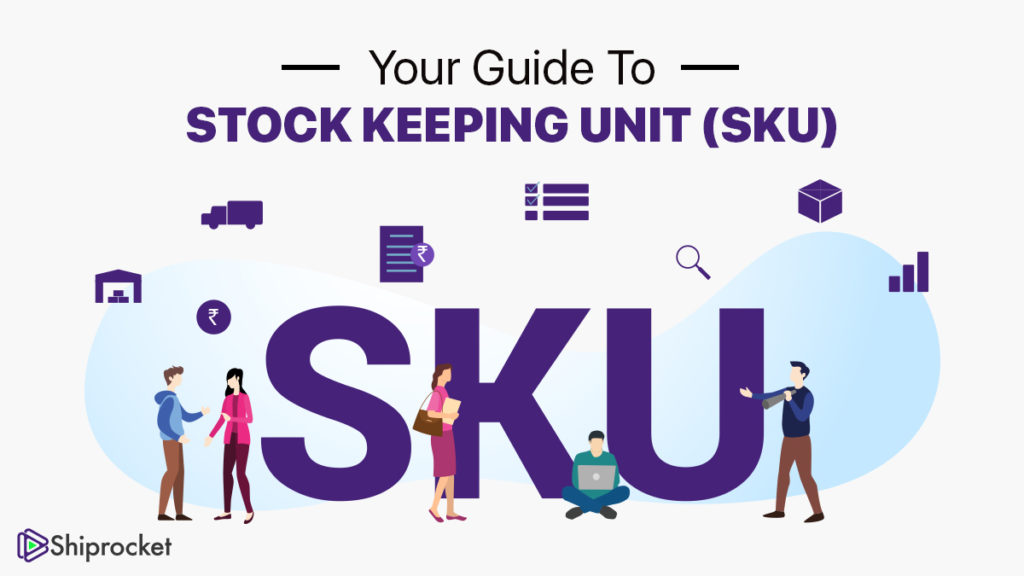Understanding Product SKU: How to Introduce Your Products
Stock Keeping Unit (SKU) is a unique code for an item; a company intends to sell. An SKU provides specific details about the product, such as size and color variation. The Product SKU is exclusive for each product and varies within a product range. Furthermore, it is designed to be read by the human eye, unlike a barcode. By using SKU, businesses can measure highly accurate inventories, which helps with improving their stock management.

What is Product SKU?
SKU is an exclusive identification code assigned to merchandise for inventory tracking. For example, you sell a T-Shirt in various sizes such as small, medium, and large, and in different colors like white, magenta, and blue. In this case, each size and color combination would have an exclusive inventory and, therefore, its own SKU.
An SKU is formed and allocated by the merchant, because
- It is simple to recognize and track individual inventories
- It is created to offer an insight into the product (size, color, texture, etc.)
- To recognize merchandise via SKU instead of digging deeper
Why Use SKU and Not Barcode? Reasons Explained
Difference Between An SKU & Barcode
A barcode is a pattern of parallel lines of varying widths that are supposed to be read by a machine and printed on merchandise for controlling stocks. On the other hand, an SKU is a set of numbers to be read by the human eye to take control of an inventory. Since both do the same job, then why choose an SKU over the barcode?
An SKU is exclusive to your eCommerce business; however, barcodes are not. If you resell your products, then your network of sellers may change the barcode on a product each time they host it on your store, and that would throw SKU out of synchronization.
Why an SKU?
By using SKU, you can conveniently update your stocks and manage the inventories, regardless of barcode changes made by the following –
• Product Catalogues
• eCommerce platforms
• Trade-based customers
• Marketplaces like eBay, Flipkart, Amazon
Why Product SKUs are Important? Reasons Explained
- SKUs are significant and helpful as a general reference for trailing inventory across every part of your eCommerce business.
- While the name or explanation of your products may alter or be slightly modified depending on the utilization (purchase order or in a listing on a sales channel), the SKU will remain reliable and enable you and your employees to identify the product variations quickly.
- SKUs are supportive when sorting auction reports or inventory.
- SKUs are perfect for merchants with a multi-channel sales strategy. If you would like to sell your merchandise on eBay and Amazon, you are likely to have different product titles for the same item on each of these sales channels.
How to Master the Trick of Creating Product SKU?
Making a unique SKU
Make a unique SKU for each inventory item you advertise or sell and never use an SKU again for a product you don’t sell anymore.
Keep SKU short
SKUs always will be a maximum of 30 characters long. If it is longer than 30 characters, then they become hard to interpret and may not work with some inventory management systems.
• In SKU, never use spaces or special characters – Always use simple characters to make it simple and easy for people or SKU reading software to read the SKU.
• In SKU, don’t just use the product title – Use short as well as brief descriptions for the product title, not the SKU.
• Never start your SKU with a zero – Never use “0” at the beginning of SKU as the Excel spreadsheet will strip out the 0 and disrupt the entire data.
Now, it is high time you set SKU for your goods, as it will make your life more comfortable, and it will permit you to use registering and inventory management solutions efficiently.
How can Retailers Use SKU Numbers to Boost their Business?
SKU number can boost your business in the following ways:
Track Inventory Accurately
SKUs are used to track products. So, they can be used to track inventory accurately. This helps in knowing the exact availability of the products. When you continuously track your product numbers, you know their exact status and you know when to order more merchandise. This ensures you never go out of stock.
With accurate SKU numbers come efficiency and productivity. Also, if you can track the products in real-time, you know your business’s evolving needs better.
Forecasting Sales
Knowing accurate numbers of the inventory can also help forecast sales. As a result, you have enough inventory in stock. This shows you as a reliable merchant to your vendors and customers.
But, when you forecast sales using SKUs, you need to be more strategic before you completely eliminate slow-selling products from your inventory. Some of your important customers may still require them, and if you stop selling them, it might hit your business hard. Instead, you can consider how your customers purchase products.
Make the Most of Biggest Profit Generators
SKU architecture can help you figure out what important items are for your business and the most desired products. Besides knowing when to reorder more products, you know how to be more creative with the highest-selling items. By knowing your best-selling items, you can strategically display your products. This will help the customers easily locate the products – whether in the retail store or on your online store’s website.
Customer Satisfaction & Loyalty
When you run out of stock, your customers might want to wait rather than buy from elsewhere.
Conclusion
The benefits of using SKUs are that they are human-readable, and the relationships between products can be more easily discerned, such as different sizes of jeans. If your online store sells several products, merely looking at a list of barcodes is not very helpful for identifying what the product is, without a scanner or looking up the barcode in the database.
They ensure accurate inventory tracking and make merchandise management easier for your business.
Avoid beginning with the number zero, don’t use numbers that look like letters, avoid using manufacturer numbers in SKUs, and make them short and meaningful.
No. The SKUs are for internal inventory management. You can list one SKU on multiple websites and conduct your eCommerce business.






